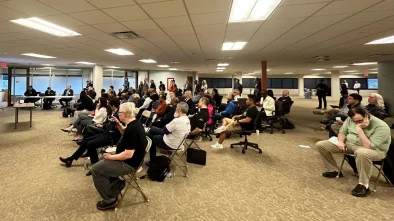Princeton-Based Yoda Tech Uses MicroBots to Transform IT Operations
Aiming to help pharmaceutical companies cut costs, speed troubleshooting
Yoda Technologies (or “Yoda Tech”), a bootstrapped startup that was established in 2013 in Sydney, Australia, and later expanded to Singapore, has brought its MicroBot technology to Princeton, to address the U.S. information technology market from there.
The company uses MicroroBots to automate IT applications, infrastructure and cybersecurity operations support.
This wasn’t always the case. Yoda Tech began as a company that focused on building digital banks and testing utility models. The early Yoda Tech built a niche for itself in providing R&D services to organizations that were building new products and strategies.
As robotics and machine learning entered the technology picture, however, the company shifted towards incorporating bots and bot frameworks to transform IT operations. By dissecting and deconstructing “human and technical actions stretching across 1000s of IT processes,” the company “created a micro blueprint of the thought process that goes into how technical resolutions are decided and implemented,” Yoda Tech says on its website.
NJTechWeekly.com spoke to Amit Jalali, Yoda Tech’s founder, who noted that his company now has a team of 200 people around the world, all of whom have spent a couple of decades in the industry. Team members in the U.S., South Africa and Belgium are working with pharmaceutical companies in Switzerland. Other teams are in the Philippines, Malaysia, India and Singapore. “We are proudly still bootstrapped and highly profitable, and growing at 100 percent year over year,” he told us.
“We were very successful in Singapore,” Jalali recalled, but he added, “Frankly, I wouldn’t recommend starting there. If you want to grow and expand, you have to move to the U.S.”
Jalali picked the Princeton area because “we’ve built a lot of intellectual property in the pharmaceutical industry. And since we are working a lot with the pharmaceutical industry, Princeton becomes a very viable place.” Most of the company’s target customers are within a 30-mile radius, he said.
Explaining the technology, Jalali noted that MicroBots target small areas of automation. “You should not be doing extremely large-scale automation because large-scale automation is very difficult to implement, and requires a lot of changes,” he said. “Therefore, you should focus on extremely small tasks to be automated. We have worked out a mechanism by which all those unique MicroBots can then combine together to accomplish a lot of activities.”
The technique works well in IT operations, which Jalali told us was a $1.1 trillion opportunity. IT operations have three distinct parts, he said:
- Application operations, which include enterprise resource planning (ERP) systems, customer relationship management (CRM) systems and business intelligence systems.
- Infrastructure operations, which include computers, data center storage, networking, end-user computing points, mobile devices, laptops, etc.
- Cybersecurity operations, including firewalls and operations to protect against any kind of phishing, malware and junk, and against hack attacks on systems and environments.
When organizations have problems in any of these areas, a trouble ticket is usually created, and eventually the problem is solved. With MicroBots, Jalali said, “The moment a company is faced with a specific kind of a problem, a very specific MicroBot, or a combination of MicroBots, comes in to resolve it.”
The technology is built on Microsoft’s platform, Jalali said, because 90 percent of the companies Yoda Tech approaches already have Microsoft email and core technology, and are familiar with Microsoft’s licensing structure. The data created stays inside the company, so it doesn’t run afoul of any privacy laws, Jalali said.
MicroBots are created through an aggregation of Microsoft technologies. There’s PowerShell scripting, which is used to automate programing. Also, “you need workflows, which I built using a tool called ‘Power Automate.’ You need applications to interact with users. And those applications we build in a no-code technology called ‘Power Apps,’ again provided by Microsoft. And we capture a whole lot of data and intelligence, and all that business intelligence shows up in Power BI. So, I’ve combined all those Microsoft technologies and tools and packaged them together.”
Jalali then addressed the elephant in the room: that this technology will eliminate jobs. “It’s not that you don’t need people. You still need people, but you need people to take care of exceptions. So, people will be needed in scenarios that you’ve never seen before. The role of people should not be operations. The role of people should be creativity.”
“They should be thinking ‘What is next?’ Or ‘What are the business problems I need to resolve?’ They should not be looking back and saying, ‘I will run operations and support for your previous 20 years of legacy systems.’ You can spend your time learning new technologies because now you have the pressure off of operations.”
Yoda Tech is growing through word of mouth, as company CIOs are telling other company CIOs about its product. Jalali said, “We are often able to reduce costs in some areas by 80 percent. Companies that used to spend $15 million to $20 million a year on a specific activity are now spending $2 million to $3 million. And, more importantly, they’ve been able to show an extremely good end-user experience because what earlier used to take three to five days for a tech guy to come in and resolve, is now done in between two to three minutes, from the time that you face a problem with a user to the time it gets resolved. You are showing a remarkable user experience by increasing the service levels. We don’t need an initial sales team. What we have is credibility. It’s a reference market.”




